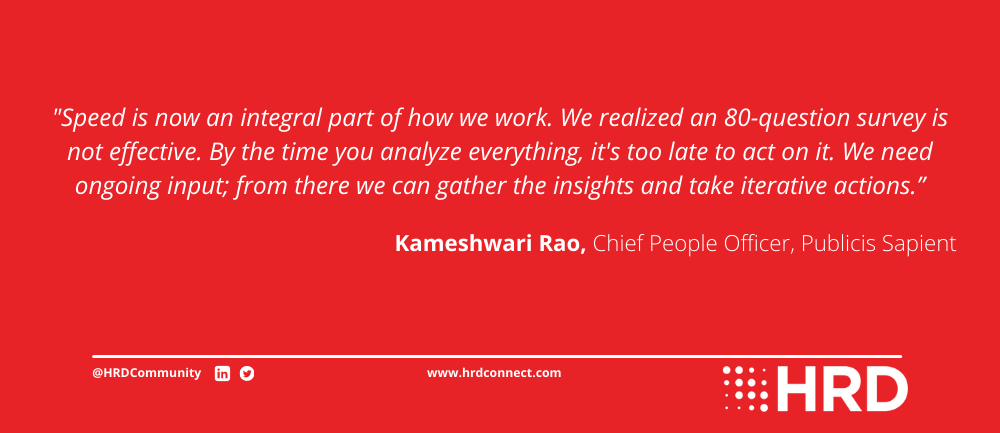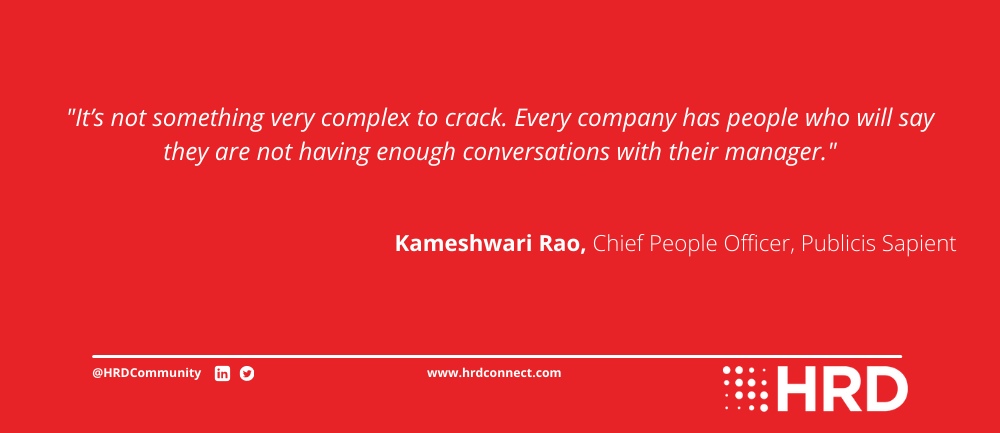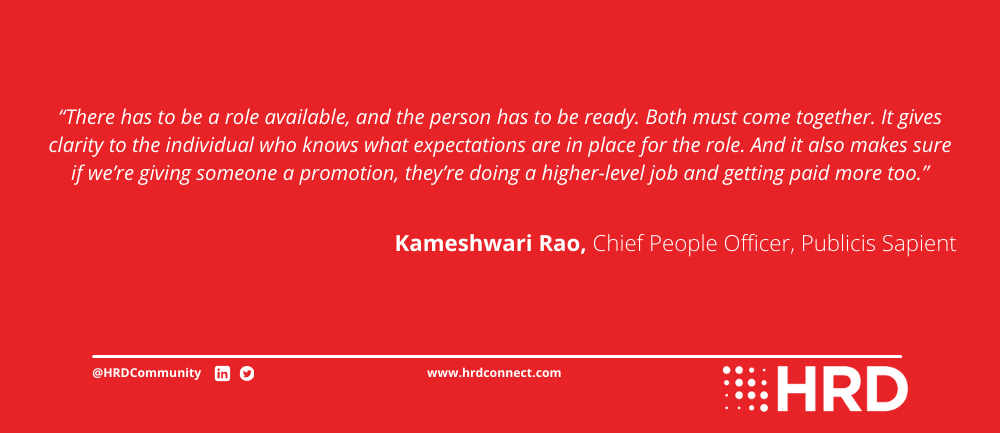-
Provided by

- Date published: May 2, 2023
- Categories
How would you describe your approach to appraisals or performance review process? Is it agile, actionable, and supported by well-trained managers, or infrequent, inaccurate, and unfair?
Moreover, would your employees agree? A 2017 Gallup survey found that just one in five employees felt motivated by their organization’s approach to performance management. But the future for performance management looks brighter. The HR Research Institute’s 2022 study finds that 69% of HR professionals expect that over the next three to five years, performance management will be based on more frequent and natural conversations.
Publicis Sapient is ahead of the curve with dynamic approach to performance appraisals . It has upgraded its twice-a-year promotion cycle to monthly promotions. Employees are eligible for an elevation each month provided there is financial justification, a capability expectation, and a role available.
Kameshwari Rao, Chief People Officer at Publicis Sapient, joins HRD to speak about this agile approach to performance management.

Effective employee listening
The past two years for Publicis Sapient have been a period of unprecedented growth and hiring, from experienced employees to campus graduates. And yet, it has been no stranger to the strain of The Great Resignation, with employees coping with a higher workload and continuing their adjustment to remote-first working.
During this period, Publicis Sapient reset its people strategy. “We focused on creating the right environment and experience for each individual.” explains Rao. She emphasizes that to reduce attrition, HR must address all areas of employee experience, always keeping an individual at the center of all work.
“Five years ago, we started to address employee happiness. Three years ago, we began to measure it consistently, every six months, through employee listening. Where we are today is an evolution.”
The need for speed
Furthermore, about three years ago, Publicis Sapient’s HR team elected to focus on technology and analytics. This has catalyzed the creation of a more sophisticated and smarter tech-driven employee listening strategy powered by business intelligence.
“Because we now have so many data points, we can be specific to individuals but also make broader changes. Speed is now an integral part of how we work. We realized an 80-question survey is not effective. By the time you analyze everything, it’s too late to act on it. We need ongoing input; from there we can gather the insights and take iterative actions.”
Since 2020, HR now looks beyond the long surveys to more streamlined and varied check-ins. Publicis Sapient runs micro-level check-ins, such as ‘Listening Circles’ and ‘Geo Circles,’ to discover attitudes at a small team level. “The focus is to take our leadership to our people and to have direct conversations,” explains Rao.
It also uses 90-day ‘pit-stops’ to track the sentiment of new hires and work anniversary check-ins to gauge the ongoing sentiment. Lastly, there are much shorter versions of the engagement surveys that only use fifteen questions. They run at an organizational level twice a year to understand what is happening in specific regions and track the rate of change.

Achieving retention through agile appraisals
When Publics Sapient first began measuring employee happiness in 2020, it found its people were happy, typically scoring between eight and ten (out of ten). But a deeper look showed people felt they were not having enough conversations or receiving the right level of feedback. “It’s not something very complex to crack. Every company has people who will say they are not having enough conversations with their manager,” explains Rao. Moreover, Publicis Sapient discovered its people were frustrated by the promotion cycle and having to wait at least six months at a time to be eligible.
Its historical model for performance appraisals was based on rating and ranking. Gradually, over the past eight years, it has shifted to a growth mindset-oriented approach. But, three years ago, having discovered a lack of conversations, it set about establishing a new and agile approach to appraisals and employee-manager interactions.
O3s
Every employee now meets with their manager once a week for 30 minutes, split into three ten-minute segments:
- How are you doing and what would you like to discuss?
- What are my expectations?
- What would help you grow?
Managers log conversations to ensure they have taken place and every manager has received training on navigating these types of conversations. The managers receive training depending on their level of experience. New manager training equips first-time managers with the essentials, from approving leave to more detailed Publicis Sapient policies and processes. Secondly, managers may receive deeper training on having honest conversations, conducting unbiased interviews, and setting expectations with employees. Lastly, managers received training in performance management to support them with the shifting appraisal process.
“With the help of an external partner, we trained all our VPs and Directors and our training consultants so they could run the required training themselves with their respective teams. We tracked and ensured every manager received training on the one-to-one O3 conversation.”

Agile appraisals
Publicis Sapient’s historical process for appraisals was complex. Promotions were on offer twice a year only. This took significant planning to understand how many people, the managers could promote, followed by an eight-week exercise to promote the right individuals. This process is now far simpler.
The promotion application is employee-led rather than manager-led. “If you think you’re ready for a promotion, go ahead and put in your application!” states Rao. “The individual takes ownership for their growth and takes on responsibility for their development areas.”
This approach places far more control in the hands of the individual. The scores on its happiness survey have risen significantly because of this one change.
This new decentralized model for appraisals and performance management avoids the chaos, stress, and tension caused by twice-yearly promotions. Alongside individual readiness, there does still need to be a business case, as Rao explains:
“There has to be a role available, and the person has to be ready. Both must come together. It gives clarity to the individual who knows what expectations are in place for the role. And it also makes sure if we’re giving someone a promotion, they’re doing a higher-level job and getting paid more too.”
“The overall redefined process ensures that we are being efficient. And that our people are rightfully getting the value that is due to them.”
At the backend, this requires several teams to come together. It involves HR, finance, and staffing, to name a few. But at the front end, Rao argues it gives individuals far greater clarity and a seamless experience: “I put in my nomination, there is a review, either I get promoted, or my manager tells me I’ll have to wait for the next role and what I need to set as a goal to prepare myself.”
OKRs
Rao highlights a huge transformation and change management process Publicis Sapient has been implementing from the top down. “We’re reworking how we translate OKRs from the CEO downward. Everyone needs clarity, so documenting objectives is a significant step. As we implement enhancements to performance appraisals, OKRs are another step to enable transparency.”
Wrap-ups
Wrap-ups impact the conversations managers, directors, and VPs have with employees about their performance. In 2021, Publicis Sapient only recorded 2% of conversations between employees and managers in writing. By the end of 2022, this rose to close to 90% thanks to the new wrap-up model. This has given Publicis Sapient much clearer visibility into how its employees are performing against their respective goals & objectives. Rao describes how these shifts have influenced Publicis Sapient’s approach to ongoing performance management.
“From an ad-hoc approach to appraisals, it’s become more systemic. We now have a good documentation system, improved workflow processes, ongoing promotions, talent reviews, and succession planning. As we scale and grow as a company, we need this system as we can no longer rely on memory.”
Next up on the agile appraisals agenda
Publicis Sapient and Rao are proud of their work to establish this revolutionary approach to performance management and promotions. Having overseen the adoption of agile employee listening and appraisals, Rao will define future plans through ongoing employee feedback.
“There is so much in the vision and areas we want to make an impact! This includes the promotion experience. In fact, we conducted a survey to gauge its efficacy. We interviewed everyone involved, from the manager or people who surveyed and assessed the application to the individual they approved or denied. Based on the feedback we’ll now improve the process.
“But beyond that, we’re also looking to create a learning ecosystem in the next year that connects individuals based on capability and skills. We understand that as an individual the onus on upskilling is on them, but if the organization creates a platform to enable them, it’s a win-win for both.”







